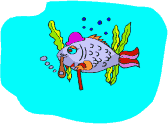 |
Fishing Stories from Ned Kehde |
|
Fishing Reports Reader's Nook Angler's Academy Club Corner Tournament Trail Success Stories Kansas Angler Info Angler Links |
Submitted by Ned Kehde - Nov. 9, 2000 One problem is that the white bass is an unprotected species in Kansas waterways. Thus, anglers can kill as many white bass as they can catch. Another woe is that they are susceptible to fatal diseases. For example, a bacterial virus killed about 60,000 white bass at Melvern and Pomona lakes in June of 1999. Although the count of dead white bass was minimal at Perry and Clinton lakes, the white bass fishing at those waters turned extraordinarily trying in 1999. Thus, anglers suspected that something lethal had afflicted the white bass at those waterways, too. For instance, the fishing was so rotten in the fall of 1999 at Perry that Pok-Chi Lau of Lawrence, who normally catches 40 to 80 white bass on a typical autumn outing, failed to catch one. And the fishing didn't get any better during the spring of 2000. During this past summer and early fall, however, Lau and a few other anglers ultimately discovered the whereabouts of some white bass at Perry and Melvern. There were even some sporadic catches at Clinton and Pomona. The reappearance of the white bass is a testimony to their resilience. What's more, this species ability to rebound in the big reservoirs around Lawrence shows that these waterways have the potential of being some of the most fruitful white bass abodes in the Midwest. If that occurred, anglers could tangle with these pugnacious creatures day in and day out. To accomplish that feat, Blevins and Lau say that the white bass need some help from fishermen and Kansas Wildlife and Parks. Unfortunately, the KWP treats white bass as if they are an undesirable species like carp, gar and buffalo. That has been the case since the first Kansas reservoirs were constructed a half of a century ago. Of course, the KWP doesn't publicly confess to its dislike of the white bass. But several anglers noted that a few KWP biologists seemed to be pleased that the white bass were afflicted with the deadly bacterial virus. One biologist stated that the massive white bass kill improved his lake's biomass and helped the walleye, which is the KWP's favorite species. Blair Flynn of Overbrook contends that the KWP doesn't know how to managed such short-lived species as a white bass, which lives about four years. Therefore, it has opted for a laissez-faire management style, allowing the white bass to fend for themselves. According to this type of management, fishermen are encouraged consume the bulk of these short-lived creatures before they die of natural causes. That primal style of fisheries management irritates Lau. He says just because hundreds of white bass die from the incisions of a fillet knife, doesn't mean that they will be properly consumed. And when folks toss their bundles of freezer-burned white bass into the garbage, the KWP's boundless creel limits on white bass encourages wanton waste. Flynn says that the KWP's hands-off management style for white bass worked as long as the lakes were young and fruitful and the fishing pressure was slight. But those days are long gone. It is time for the KWP to establish stringent creel limits and educate Kansans about the joys and benefits of catching and releasing the same white bass more than once over a four- year span. |
|
Kansas Angler Online Sponsor  |
Copyright 2000 by The Kansas Angler - P.O. Box 12261 - Wichita, KS 67211 - Phone 316-265-5551 Questions or problems with this website should be directed the link above. This Page Last Updated on date shown at top of page. |

